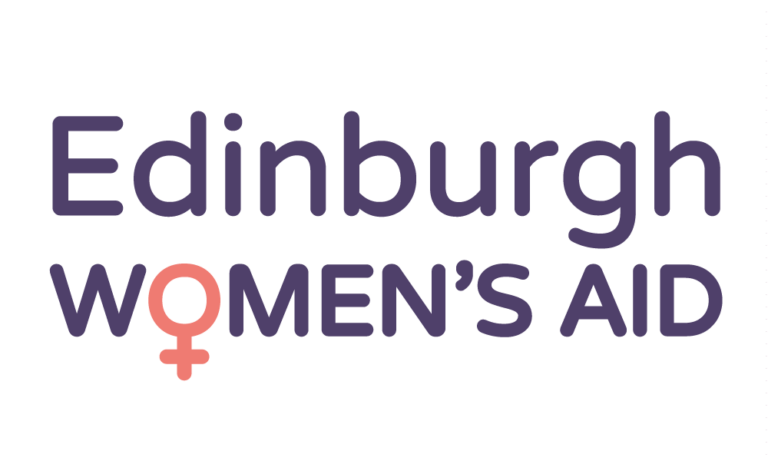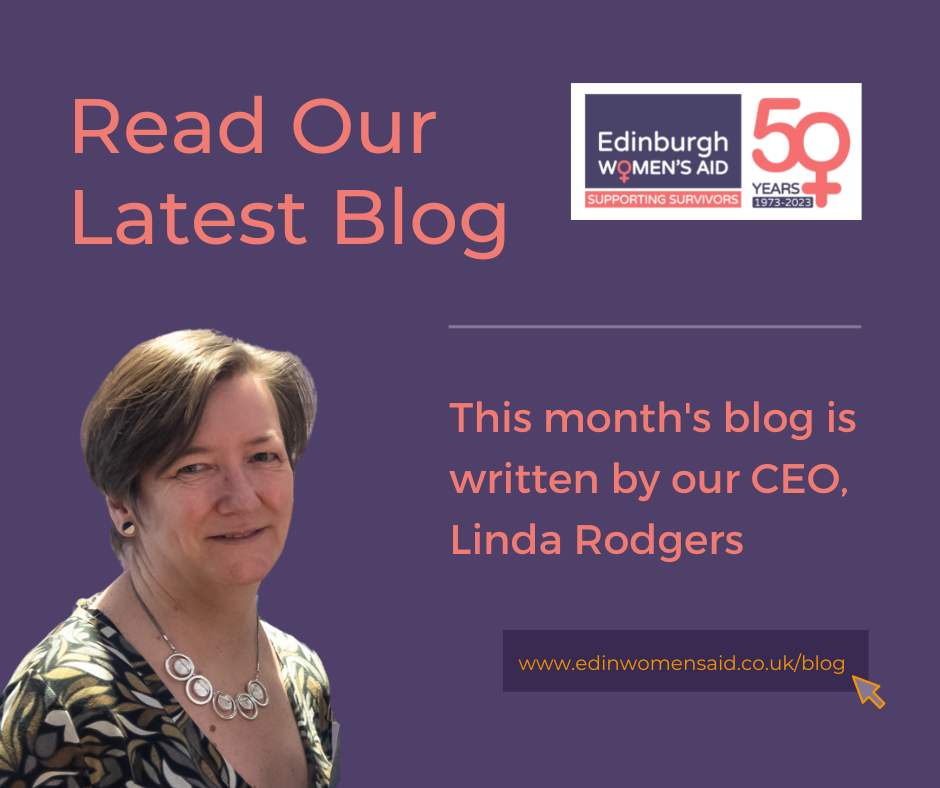This month’s blog is written by our CEO, Linda Rodgers, as she reflects back on the last 50 years of Edinburgh Women’s Aid…
At our 50th anniversary launch event, looking at our amazing banners for each decade and listening to the stories of women who have been in the women’s aid movement for many years, I reflect on parallels between my own journey as a girl and woman in Edinburgh, (and for a few years in Birmingham), and the work of Edinburgh Women’s Aid.
At the same time as our amazing predecessors were setting up Edinburgh Women’s Aid I was starting primary school in Edinburgh. I was a ‘sort of’ twin with my cousin, 10 days older than me, a boy, we went to nursery, primary, secondary together and even to work for the same employer when we both left school at fifteen.
It feels like some things were better for girls in the early 70’s – I wore much the same clothes as my cousin (I don’t think I owned anything pink!), we played with the same toys and got our hair cut at the same barbers on Broughton Street. But, at the same time, rules about being a girl were being taught to me. “When you grow up you should get a job in a shop and marry the manager”. I’m pretty sure that wasn’t the career advice my cousin was getting. I was also pretty sure that wasn’t my plan!
During that time, unknown to me, Edinburgh Women’s Aid’s path and my own were already crossing. I recall clearly my good friend at primary wearing her ‘free June Greig’ badge, explaining to us why and telling us about her mum’s involvement in the campaign.
As EWA marked its 10th anniversary, I was leaving school and starting work at a major Edinburgh factory. I had no qualifications. The union rep told me to go to night school, telling me that “if you go to night school the company will give you day release to finish your qualifications”. I dutifully went to night school, and after a year went to the personnel department to see about getting day release. “That’s only for apprentices [mainly male] not for juniors [mainly female]”. I went back to the union to complain about this sexist policy. “Ach well, if that’s the rules.”
The newspaper articles for that year on our banners talk about ‘battered wives’, but also report positively on the funding for women’s aid services and the work of Edinburgh Women’s Aid.
In EWA’s 20th anniversary year, I moved to Birmingham, with a six-month-old baby. Just before that move, the Zero Tolerance posters along Princes Street had a huge impact on me and helped develop my understanding of violence against women as part and parcel of the general sexism in society.
As I expect every young woman experiences, in Edinburgh and in Birmingham I was subject to physical and verbal sexual harassment. The work of feminists such as those in EWA and Zero Tolerance, feminist writers and theorists helped me to put that into context and showed a way through activism to challenge the patriarchy.
During my time in Birmingham, my understanding of domestic abuse as emotional and psychological and not just physical developed, as it did in wider society through my own experiences, through the things I saw female friends experiencing, and through connections in the third sector with the work of local violence against women organisations.
Working in the equalities and disability sectors I learned to take a more rights-based approach to working in communities, and over the years I noticed that the child protection training I attended changed to reflect a much better understanding of the impact of domestic abuse on children and young people.
During this period Edinburgh Women’s Aid set up its specialist children’s service and began to raise the voices of children as victims in their own right and with their own views.
Ten years later, as EWA celebrated its 30th anniversary I moved back to Edinburgh and continued the path that brought me to Edinburgh Women’s Aid. Working first for a disability charity and then after a few years moving to a role in Scottish Women’s Aid.
While at Scottish Women’s Aid, I attended the 40th Anniversary events for Edinburgh Women’s Aid and a year later took up the role of CEO and my personal path and EWA’s journey intertwined.
I am so proud to have worked for this amazing organisation for the last nine years. To carry on the legacy of the amazing women who changed the face of responses to domestic abuse in Edinburgh and Scotland. I lead an organisation that has always been willing to change and which has been at the forefront of meeting the changing needs of women, children and young people affected by domestic abuse. I hope to continue that legacy. During the last few years we have developed new services, including the CEDAR project, art therapy, our specialist housing and mental health roles and new approaches to children’s rights, advocacy and to tackling abuse in young women’s relationships. We plan to continue to develop innovative services.
The key achievement for Scotland in the last 9 years has to be the passing of the Domestic Abuse Scotland Act, which criminalized coercive control. Women had been telling us for years about the impact of controlling behaviour on them and for many years our services had been providing the long-term emotional support to help them recover and move on with their lives. The recognition of the impact and criminality of this behaviour in law was a huge validation that their voices had finally been heard.
Going forward, I still believe we can see a Scotland free from domestic abuse, but so much work still needs to be done. Service generated risks still exist, recently we’ve seen a pattern of abusers reporting their victims as perpetrators, presenting as high-risk victims and denying their children access to support services. We regularly see the enabling of abusive behaviour through civil courts.
Edinburgh Women’s Aid is in this for the long haul, as long as there is a need, we will be here for women, children and young people affected by domestic abuse and we commit to continuing to develop our services to their needs and to supporting them to raise their voices.

